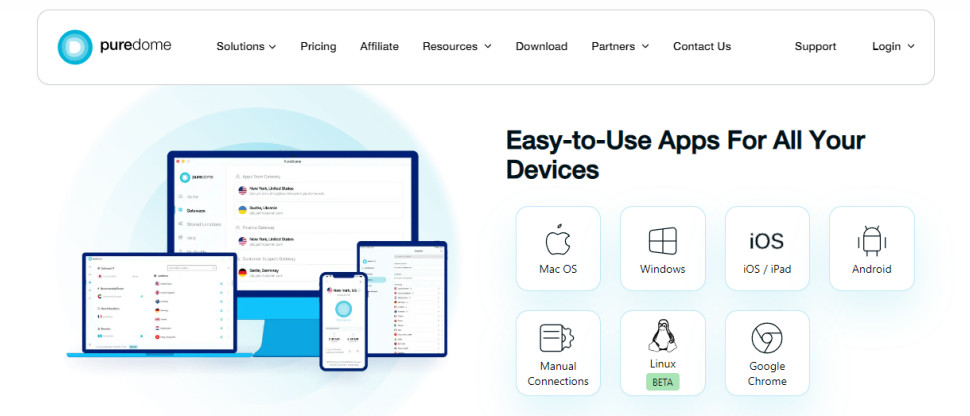TechRadar Verdict
PureDome could work for small teams who need a simple VPN with centralised billing and some quality user and device access controls, but it can't match the management or reporting tools of the top competition.
Pros
- +
Decent mobile and desktop apps
- +
Lots of locations
- +
Reliable kill switch
- +
Can allow or block desktop access depending on antivirus, OS version, files, processes, more
- +
Can enforce your preferred VPN settings on users
- +
30 day free trial
Cons
- -
Requires a minimum of 5 user licenses
- -
Web console gives little detail on how your team are using the service
- -
Potential DNS issue with the Windows app
- -
Short on advanced user management or reporting tools
Why you can trust TechRadar
PureDome is a capable business VPN from the people behind PureVPN, one of the most experienced consumer VPN providers around.
Signing up gets you all the benefits of PureVPN: easy-to-use Windows, Mac, Android and iOS apps; a vast network of thousands of servers spread across 60+ countries; WireGuard support for maximum speeds, a kill switch to protect you if the VPN drops, and plenty more.
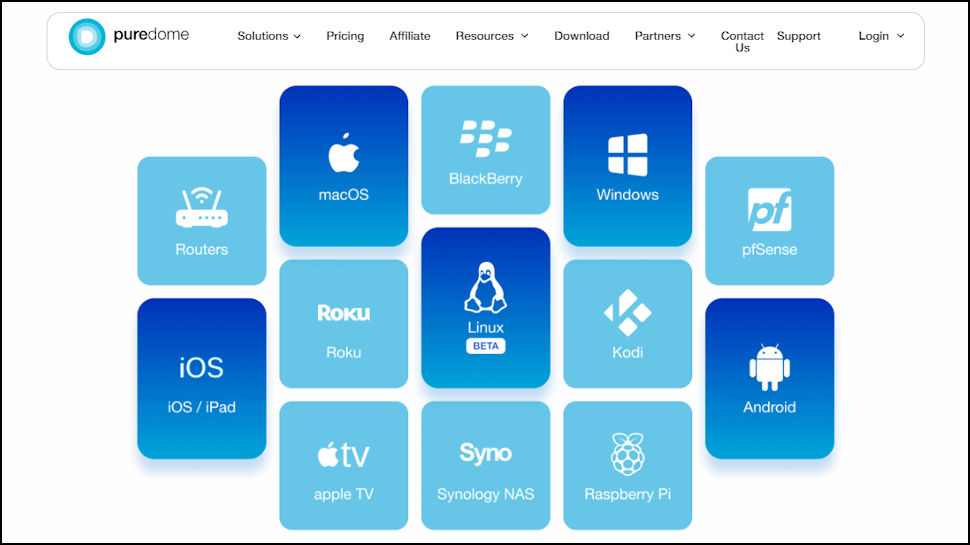
But PureDome adds business-friendly security, remote access and team management tools of its own. You can control who uses the service, and what they can do; Single Sign On support allows your team to access the VPN using their existing credentials; you can enforce your preferred VPN settings on users for maximum security, and even prevent users accessing the VPN unless, say, they're running your preferred antivirus.
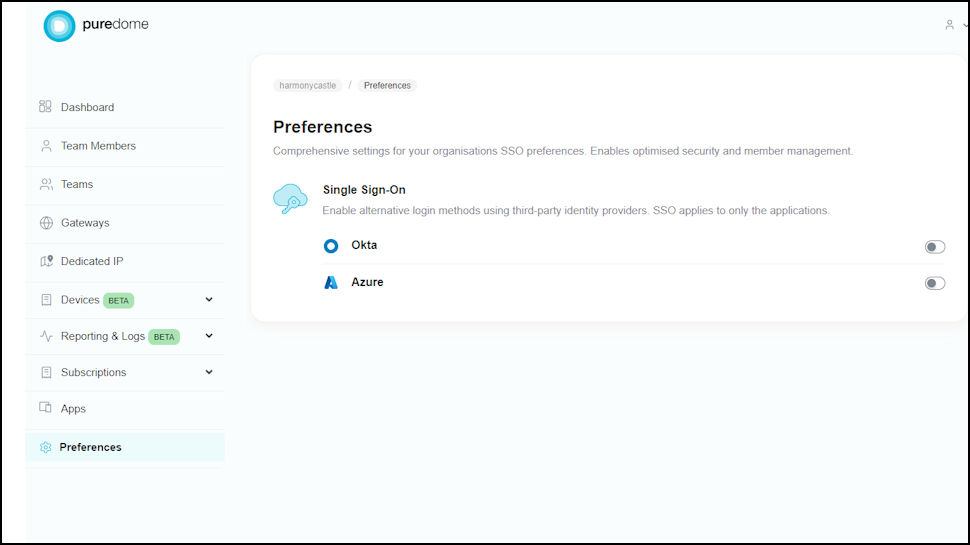
In this review, we'll take an in-depth look at the VPN, its apps, speed and security, and especially its high-end business features.
But if you're mostly interested in PureVPN and its consumer features, you'll find more details on this in our full PureVPN review.
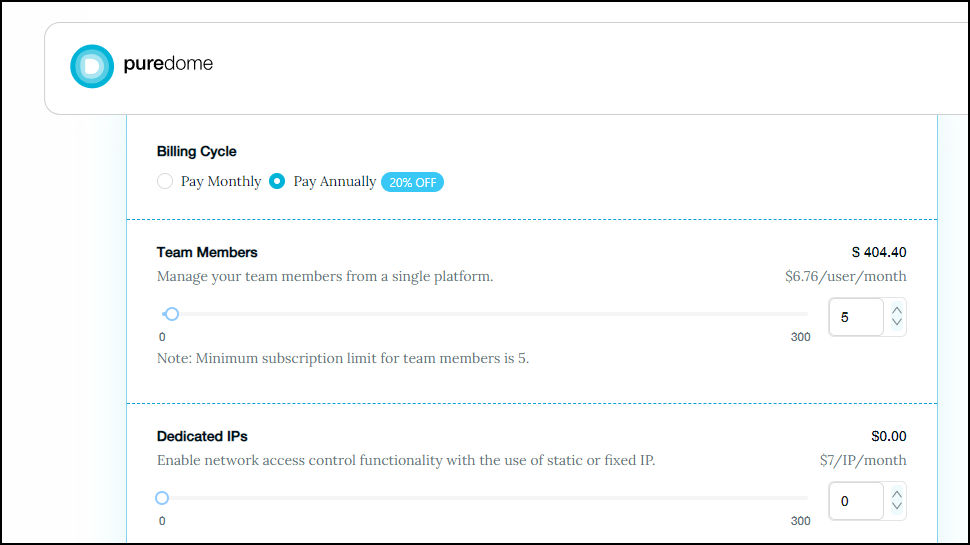
Plans and pricing
PureDome is fairly priced for monthly billing at $8.45 per user billed monthly, but this only drops to a relatively high $6.74 on the annual plan.
There's also a potential catch. PureDome has a minimum subscription of five team members, which means the least you can pay is $42.25 billed monthly, or $33.70 on the annual plan.
You can add a dedicated IP for $84 per month, but this can only be assigned to one of your users.
If you need a unique and static IP for all your users, you'll need to spend a chunky $600 per month for a dedicated gateway (essentially, your own VPN server.)
Payments are accepted via card or PayPal.
PureDome is more expensive than some of the competition, but there is some positive news. Although PureDome asked for our payment details when we signed up, it doesn't charge until the end of the billing period. That effectively means there's a free 30 day trial, and as long as you cancel before that time is up, you won't be billed.
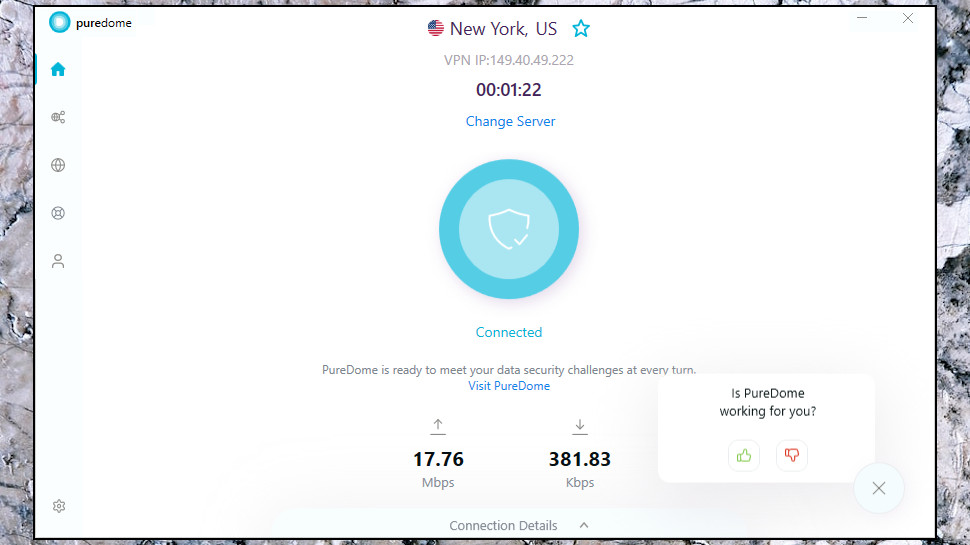
PureDome apps
Business VPN apps are often underpowered, and with a range of usability issues. That's no surprise: business VPN providers might know how to create site-to-site network connections through every possible type of firewall, but developing quality apps requires very different skills, and it's often not a priority.
PureDome is a little different, because its apps are essentially based on PureVPN's range. That means a wide choice of platforms, with downloads for Windows, Mac, Android, iOS, Linux, even Chrome support. They include all the features you'd expect from a consumer VPN - WireGuard, IKEv2 and OpenVPN protocol support, a kill switch, split tunneling, location favorites and more - and yet they're also easy to use, even for the least experienced of users.
Our in-depth tests did highlight a DNS issue. When we connected using WireGuard or IKEv2 on Windows, our checks showed no DNS leaks, with PureDome using its own DNS server to resolve queries. But when we connected using OpenVPN, PureDome appeared to use Google DNS, which means information about your browsing is leaking outside of the tunnel. This probably won't have any practical effect (Google already has far better ways to track people than analysing DNS queries), but it is still a privacy concern.
PureDome's apps scored elsewhere, though. The Windows app kill switch correctly blocked our internet access, for instance, whenever we forcibly closed its VPN connection. That already outperforms many competitors (UTunnel VPN's Windows app doesn't have a kill switch at all.)
There's another welcome plus in PureDome's new support for Single Sign On. That's good news, as it allows users to sign in with existing credentials, rather than create yet another account for PureDome. The service only supports Okta and Microsoft Azure AD right now, but the feature has only just arrived; hopefully Google and others will land soon.
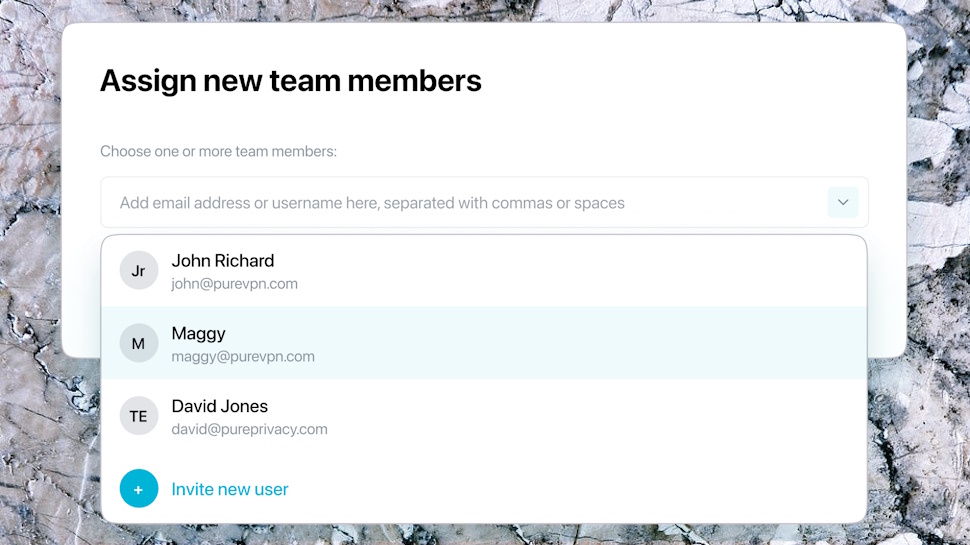
PureDome User control
PureDome makes it unusually easy to give your team members access to the VPN. Tap a button, enter an email address, and you can send an invite with a click. Or if you've a big team, you can even import the full list in a CSV file, and send them all at once.
As usual, you're able to assign each user a Role which defines what they can do on PureDome. For example, by default, users are assigned the role Member, which allows them to use the PureDome app but nothing else. But you can also give them other roles which might allow them to, say, change your billing details, add or remove members or tweak network settings.
PureDome also supports organising users into separate teams: Sales, Accounts, Engineering, whatever works for your business structure. This allows you to restrict each team to its own gateway (Sales can't access the Accounts systems, say), and you can also apply different VPN access rules to each team (more on this below.)
While this all works as advertised, it's a little limited. We found PureDome couldn't show us which users were connected to the service right now, for instance. There's no connection history, and no information on the devices they use. PureDome is working hard on adding new features, and we've no doubt this will improve over time, but right now, at least, it doesn't have anything like the user control and logging options of the competition.
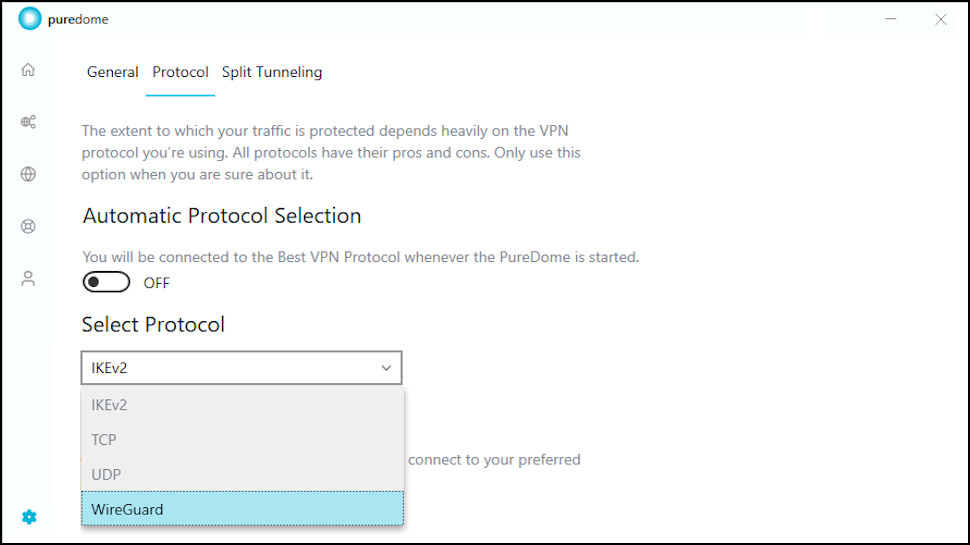
App settings control
As we've discussed above, PureDome's apps have all the most essential VPN settings. You can set an app to load and optionally connect when your device starts; choose your preferred protocol, enable the kill switch, show connection notifications, and more.
We've seen more configurable apps, but PureDome has a handy plus: you can enforce particular settings on your users.
If you want your team to leave the kill switch enabled for security, for instance, all you can do with most VPNs is send a group email and ask them nicely. But with PureDome, you can enable the kill switch, set your preferred protocol or whatever other settings you need, then enforce these settings on some or all of your users.
We set up some preferred app settings, then imposed them on our test MacBook, and tried a few tests on the app to see what happened.
The results were positive. We were able to force some or all of our users to keep their kill switch enabled, for instance, ensuring they always had the best possible security. That's a very welcome feature that we rarely see elsewhere, even with some major business VPN names.
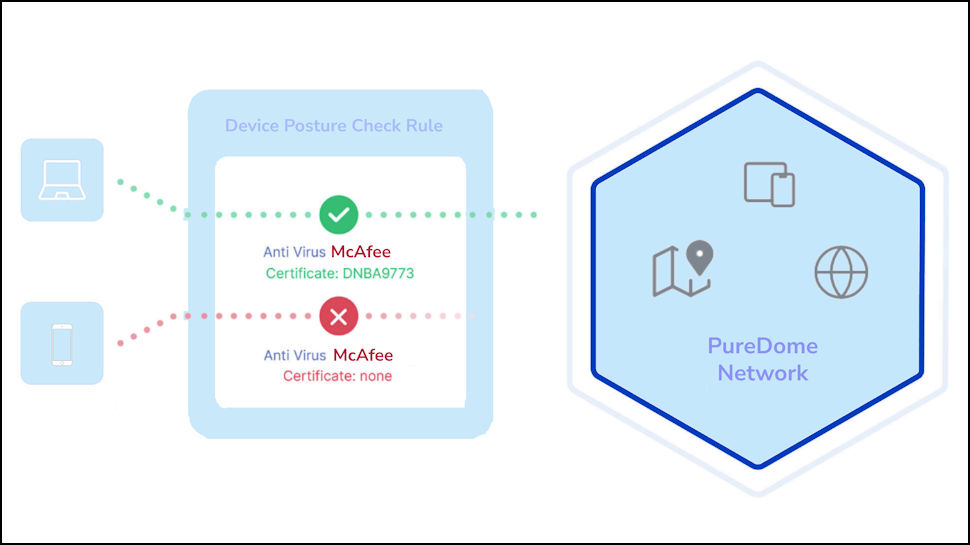
Device control
PureDome includes a feature called Posture Check. This allows you to block or allow access to the VPN, depending on how the user's device is set up.
If users connect with Windows devices, for instance, you can choose to only allow access if they have your preferred antivirus, or a certain certificate installed; if it's using your preferred versions of Windows; if it has disk encryption enabled; if a particular file or Registry key exists, or a certain Registry key.
Mac users get almost the same level of control, but Android and iOS are far more basic. You can block rooted devices, but that's about it.
We were pleased to see that Posture Checks can run both when a user logs on, and at regular intervals (every 20, 40 or 60 minutes.) This makes it more difficult for users who might run a must-have program to connect to the VPN, but then close it down.
This system doesn't always work as well as we hoped. PureDome's Antivirus test can only check if the device is running one of an internal list of 11 antivirus tools, for instance. This excludes a lot of big names, so if you're running Avira, F-Secure, G-Data, Panda or Trend Micro, for instance, Posture Check won't be able to confirm that they're installed.
Still, PureDome says the Posture Check feature is in beta right now, so perhaps this will be addressed soon. Even right now, Posture Check gives you some useful ways to protect your server from dubious devices, and overall, it's a welcome plus for PureDome.
How fast is PureDome?
We measured PureDome's performance by running multiple tests on several top speed test sites and apps, including SpeedTest.net, Measurement Lab and Cloudflare.
We ran our tests from a UK cloud PC with a speedy 1Gbps connection, giving us plenty of room to see what PureDome could do.
The results were very acceptable, with PureDome averaging 610Mbps on WireGuard connections. We've seen faster VPNs - NordVPN, Surfshark, Hide.me and others reached 950Mbps and more in recent tests - but, realistically, PureDome has more than enough speed for most networks, devices and applications.
Netflix and unblocking
Like most serious business VPNs, PureDome largely avoids talking about common consumer features, such as its ability to unblock Netflix and other streaming sites. With some providers that's because they can't unblock anything at all, but is that the case here?
To find out, we checked PureDome's unblocking performance with eight streaming platforms, using locations around the world.
Netflix results were excellent, with PureDome getting us access to content in the US, UK, Australia, Canada and Japan.
The service couldn't get us into Disney Plus, but it worked with Amazon Prime, and successfully unblocked our other test platforms: BBC iPlayer, ITV and Channel 4 in the UK, and Australia's 9Now and 10Play.
That's a great unblocking result, but it could be a positive indicator in other areas, too. If streaming providers can't detect PureDome is a VPN, there's a chance that other websites will also miss it, and you'll see less 'click all the tiles containing a bicycle'-type CATCHAs.
Final verdict
Many business VPNs focus entirely on team management, permissions, auditing and high-level networking features, but forget about the usability basics. They'll have hugely powerful account management dashboards, but the most horribly basic apps.
PureDome is the opposite. It's based on the consumer service PureVPN, with its large network, decent apps and a good range of features. But it's a relative newcomer to business VPNs, and can't begin to match the best of the competition for management, access control or reporting tools.
This may not be a problem for everyone. If you're mostly looking for a VPN with easy team management, centralized billing and the ability to ensure everyone always has their kill switch on, then take PureDome's 30-day trial and see how it works for you.
But if you need fine-tuned user management, detailed audit reports or anything more advanced, we'd recommend looking elsewhere.
- Also check out our complete list of the best business VPNs

Mike is a lead security reviewer at Future, where he stress-tests VPNs, antivirus and more to find out which services are sure to keep you safe, and which are best avoided. Mike began his career as a lead software developer in the engineering world, where his creations were used by big-name companies from Rolls Royce to British Nuclear Fuels and British Aerospace. The early PC viruses caught Mike's attention, and he developed an interest in analyzing malware, and learning the low-level technical details of how Windows and network security work under the hood.
